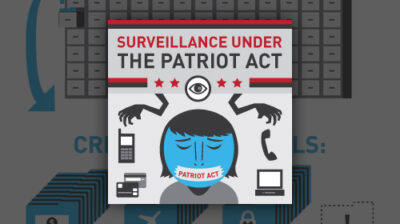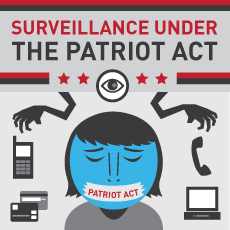
ACLU v. FBI - FOIA Case for Records Relating to Patriot Act Section 215
What's at Stake
In May 2011, the ACLU filed a Freedom of Information Act request with the Justice Department seeking information about the government's use and interpretation of Patriot Act Section 215, which authorizes the government to obtain “any tangible thing” that is “relevant to” a terrorism investigation. Our subsequent FOIA lawsuit to enforce the request compelled the government to release dozens of documents, although many others were withheld from the ACLU and the public. The ACLU continued to fight for additional disclosures concerning the government’s use of Section 215 to secretly collect Americans’ information in bulk, but the district court eventually granted the government’s motion for summary judgment in March 2015.
Summary
Section 215, perhaps the most controversial of the Patriot Act provisions that Congress reauthorized in 2011, is contrary to traditional notions of search and seizure, which require the government to show reasonable suspicion or probable cause before undertaking an investigation that infringes upon a person's privacy. Recent disclosures have shown that the government is using Section 215 to collect records of the calls made by every single American every single day, without any suspicion of wrongdoing.
In the days before Congress was to vote to reauthorize several expiring provisions of the Patriot Act in May 2011, members of the Senate Intelligence Committee raised concerns about the way that the Justice Department had interpreted and used Section 215. "When the American people find out how their government has secretly interpreted the Patriot Act," Colorado Senator Mark Udall said, "they will be stunned and they will be angry." Udall’s warning proved prescient when, in June 2013, it emerged from a series of disclosures that the National Security Agency collects from telephone companies, on an ongoing basis, the phone records of all Americans. Information collected includes on whom calls are placed to and from, when those calls are made, and how long they last. The ACLU has filed a lawsuit challenging the constitutionality of this bulk collection under Section 215, and a motion with the Foreign Intelligence Surveillance Court (FISC) seeking the release of its secret opinions authorizing the dragnet surveillance of Americans’ phone calls under this provision.
This isn't the first time we've sought information about the government's use of this provision. Back in 2002, we filed litigation under the Freedom of Information Act that eventually resulted in the release of a few hundred documents. But it has become clear that the government is using Section 215 much more aggressively and broadly than it was back then.
The secrecy surrounding the government's use of new surveillance powers is unwarranted and fundamentally antidemocratic. The public should know, at least in general terms, how the government interprets its surveillance authority and how that authority is being used. It's shameful that Congress didn't insist that the Obama administration release this information before the reauthorization vote. We've asked the courts to do what Congress failed to.
You can read more about Section 215 here.
Click here to see the documents released from this FOIA lawsuit.
Legal Documents
-
03/31/2015
ACLU v. FBI - FOIA - District Court Opinion Granting Government's Motion for Summary Judgment
Date Filed: 03/31/2015
Download Document-
03/31/2015
ACLU v. FBI - Judgment Concluding Gov. May Withhold Documents
Date Filed: 03/31/2015
Download Document-
10/29/2014
ACLU v. FBI - FOIA - ACLU Response to Government Supplemental Memorandum of Law
Date Filed: 10/29/2014
Download Document-
10/24/2014
ACLU v. FBI - FOIA - Government Supplemental Memorandum of Law
Date Filed: 10/24/2014
Download Document-
10/06/2014
ACLU v. FBI - FOIA - District Court Opinion
-
10/06/2014
ACLU v. FBI - FOIA - Memorandum and Order
-
08/19/2014
ACLU v. FBI - FOIA - ACLU Letter re: Supplemental Authority
Date Filed: 08/19/2014
Download Document-
08/15/2014
ACLU v. FBI - FOIA - Government Letter re: Supplemental Authority
Date Filed: 08/15/2014
Download Document-
07/22/2014
ACLU v. FBI - FOIA - ACLU Letter re: June 2013 FISC Opinion
Date Filed: 07/22/2014
Download Document-
07/21/2014
ACLU v. FBI - FOIA - Government Letter re: June 2013 FISC Opinion
Date Filed: 07/21/2014
Download Document-
06/13/2014
ACLU v. FBI - FOIA - ACLU Reply Brief in Support of Cross-Motion for Summary Judgment
Date Filed: 06/13/2014
Download Document-
05/30/2014
ACLU v. FBI - FOIA - Supplemental Declaration of Jennifer Hudson, ODNI
Date Filed: 05/30/2014
Download Document-
05/02/2014
ACLU v. FBI - FOIA - ACLU Opposition and Cross-Motion for Summary Judgment
Date Filed: 05/02/2014
Download Document-
04/04/2014
ACLU v. FBI - FOIA - Memo Supporting Government's Motion For Summary Judgment
Date Filed: 04/04/2014
Download Document-
07/29/2013
ACLU v. FBI - FOIA - ACLU Letter Opposing Extension of Time
Date Filed: 07/29/2013
Download Document-
07/26/2013
ACLU v. FBI - FOIA - Government Letter re: Extension of Time (attached Clapper Declaration)
Date Filed: 07/26/2013
Download Document-
06/12/2013
ACLU v. FBI - FOIA - June 2013 FISC Opinion
-
06/07/2013
ACLU v. FBI - FOIA - Government Letter Asking Court for Delay in Light of Disclosures by DNI
Date Filed: 06/07/2013
Download Document-
05/10/2013
ACLU v. FBI - FOIA - ACLU Cross-Motion for Summary Judgment
Date Filed: 05/10/2013
Download Document-
04/26/2013
ACLU v. FBI - FOIA - Supplemental Declaration of Mark Bradley
Date Filed: 04/26/2013
Download Document-
02/06/2013
ACLU v. FBI - FOIA - Unsealed Declaration of Diane Janosek, NSA
Date Filed: 02/06/2013
Download Document-
05/17/2012
ACLU v. FBI - FOIA - Order Granting Government Motion for Summary Judgment
Date Filed: 05/17/2012
Download Document-
04/23/2012
ACLU v. FBI - FOIA - Supplemental Declaration of Mark A. Bradley
Date Filed: 04/23/2012
Download Document-
02/27/2012
ACLU v. FBI - FOIA - Government Motion for Summary Judgment
Date Filed: 02/27/2012
Download Document-
02/27/2012
ACLU v. FBI - FOIA - Declaration of Mark A. Bradley (Feb. 27, 2012)
Date Filed: 02/27/2012
Download Document-
10/26/2011
ACLU v. FBI - FOIA - Complaint
Press Releases
Secret NSA Documents Released in Response to ACLU Lawsuit


